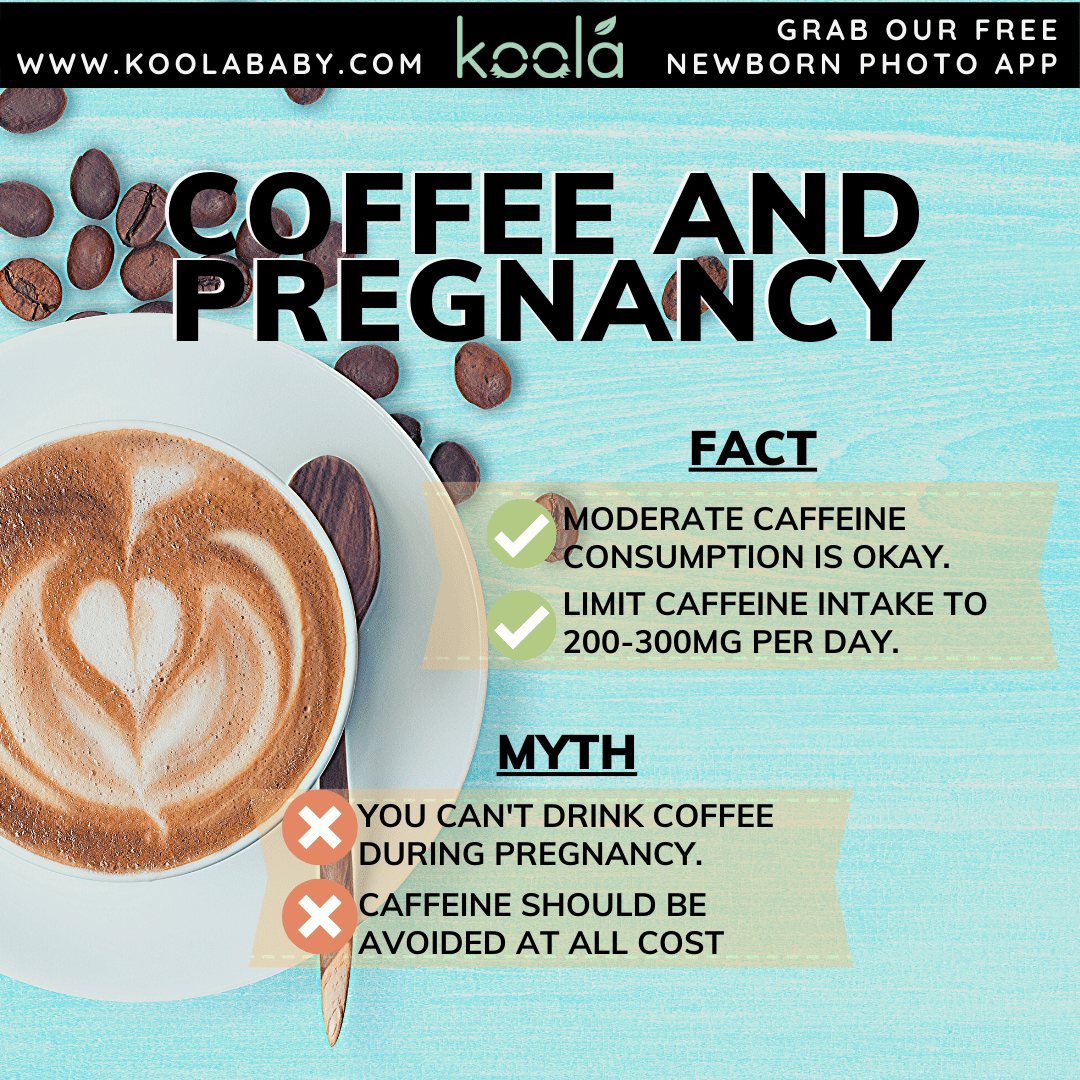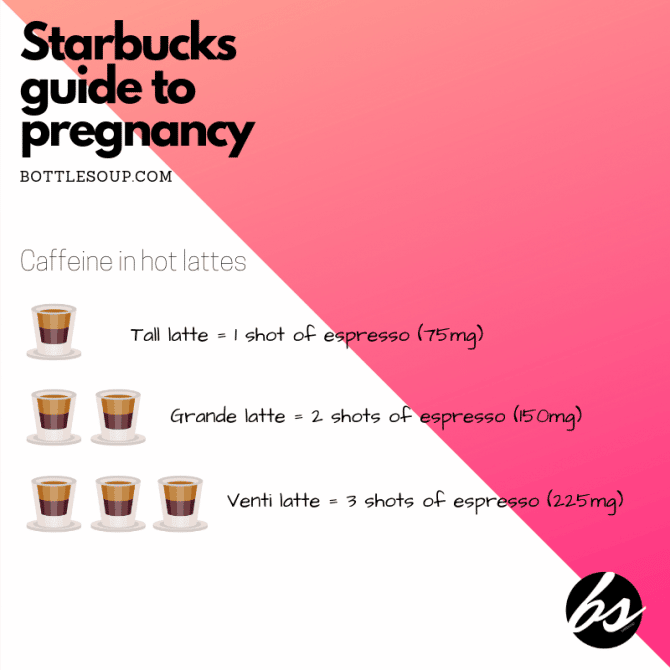What You Can Eat
- pasteurised or unpasteurised hard cheeses, such as cheddar, Gruyere and parmesan
- pasteurised semi-hard cheeses, such as Edam and Stilton
- pasteurised soft cheeses, such as cottage cheese, mozzarella, feta, cream cheese, paneer, ricotta, halloumi, goats’ cheese without a white coating on the outside and processed cheese spreads
- soft or blue cheese that has been cooked until steaming hot
- pasteurised milk, yoghurt, cream and ice cream
Is There A Safe Amount
The American College of Obstetricians and Gynecologists caps the caffeine limit for pregnant people at 200 milligrams per day . Any more than that is associated with an increased risk of miscarriage.
That said, its relevant to note a 2021 study, which found that pregnant participants who consumed the caffeine equivalent of just half a cup of coffee a day 50 mg had slightly smaller babies than those who didnt have any caffeine.
These findings are important because babies with low birthweight may have a harder time fighting off infections and an increased risk of complications like neurologic disorders and breathing problems.
Its important to note that the study didnt conclude that low doses of caffeine are directly harmful to the baby just that caffeine intake may result in a slightly smaller size at birth.
So whats the overall consensus?
Drinking below 200 milligrams is safe if a pregnant woman is able to tolerate coffee, meaning its not causing onset nausea or sickness, says Jessica Shepherd, MD, an OB-GYN and Director of Minimally Invasive Gynecology at the University of Illinois at Chicago.
Also Check: Mcdonalds Vanilla Iced Coffee Caffeine
How Does Caffeine Affect Me When Im Pregnant
You may find it doesnt affect you at all. On the other hand, its possible that you may react differently to caffeine once youre pregnant.
Coffee in particular can make you poop, so if you already find yourself running to the restroom, you may want to put coffee on the “do not drink” list until your baby makes his arrival.
And whereas you once would have been able to down three cups of coffee a day without issue, you may now find that even one small cup worsens your heartburn or gives you the shakes or jitters. Some women also find the taste changes during pregnancy.
One note of caution: Its possible that too much caffeine during pregnancy can impact your bodys ability to absorb iron, which can increase your risk of iron deficiency or anemia. If you already suffer from low iron levels, you may want to cut caffeine out entirely while pregnant. Talk to your doctor if you’re concerned.
Also Check: How To Make Coffee Taste Like Starbucks
Are There Any Benefits Of Caffeine During Pregnancy
In general, moderate amounts of caffeine have been shown to improve energy and alertness, and it can also perk you up after a night spent tossing and turning.
Consuming low to moderate amounts of caffeine during the second trimester may even reduce your risk of gestational diabetes, one recent study found. That said, theres no conclusive evidence showing that caffeine offers benefits during pregnancy.
The bottom line? Its fine to have a little bit of caffeine if you need it, provided you keep an eye on how much youre consuming. But if you didnt consume caffeine before, theres no reason to start doing so once youre pregnant.
Can Pregnant Women Drink Coffee

The short answer is yes, pregnant women can drink coffee. However, it’s important to watch your consumption of coffee, and caffeine overall, during pregnancy. Caffeine can affect your pregnancy and your baby in ways that aren’t completely clear.
The American College of Obstetricians and Gynecologists advises pregnant women to limit their caffeine intake to less than 200 milligrams per day, which could be as little as one 8-ounce cup of coffee, depending on the brand. See the chart below to get an idea of how much caffeine is in different foods and drinks.
Also Check: How To Determine Coffee Table Size
Keep Your Energy Up Safely In Pregnancy
Hormone changes in pregnancy can make you feel tired. Instead of drinking more coffee, talk with your doctor or midwife. We can recommend safe alternatives to caffeine such as:
- Adjusting exercise plans: We can help you determine if you are exercising enough or too much at any state of pregnancy.
- Changing your schedule: Allow yourself to say no to added responsibilities and new plans.
- Eating a healthy diet: We can check whether you are getting enough of the right calories, prenatal vitamins and nutrients to feel energized.
- Getting more rest: Give yourself permission to sleep in, nap, and rest whenever possible.
Make sure to skip caffeine after lunchtime if you have a hard time sleeping during pregnancy. Though caffeine can help you feel more alert and awake, it cannot give you more energy.
Your health is our top priority. Call your doctor or midwife if you are concerned about how much caffeine is safe during pregnancy. We are always here to answer your questions!
To find out whether you or a loved one might benefit from Ob/Gyn care
Statement: Caffeine Causes Birth Defects In Humans
Facts: Numerous studies on animals have shown that caffeine can cause birth defects, premature labor, preterm delivery, reduced fertility, and increase the risk of low-birth-weight offspring and other reproductive problems.There have not been any conclusive studies done on humans however, it is still better to play it safe when it comes to inconclusive studies.
You May Like: Does Athletic Greens Have Caffeine
Is Caffeine Safe While Breastfeeding
According to the American Academy of Pediatrics and La Leche League , it is safe to consume caffeine while breastfeeding. However, since the stimulant can be passed to baby, you’ll want to limit your consumption. “It is recommended for nursing parents… [to[ limit their daily consumption to less than three cups of coffee per day ” explains LLL.
How Much Caffeine Can You Have During Pregnancy
Caffeine is widely loved in America. So much that an American adult on average has around 190 mg of caffeine per day. But caffeine and pregnancy do not seem like best friends. Caffeine and pregnancy-related concerns are quite common in America too. If you are pregnant, you must pay more attention to the quantity of caffeine you are having every day.
We dont realize but we actually drink a lot of caffeinated drinks. For instance, an 8-ounce cup of coffee contains 95-200 mg of caffeine, a 12-ounce can of cola contains 25-45 mg, and an 8-ounce cup of tea contains 14-60 mg of caffeine.
While tea and coffee are regular drinks amongst the adults, few distinctive health authorities ask us not to consume them when you are pregnant.
Caffeine occurs naturally in more than 60 plants but primarily in tea leaves, coffee, kola nuts , and cocoa pods . Synthetically formed caffeine is also available, which mg in foods, drinks, and certain medicines.
You May Like: Where Can I Buy Caffeine Tablets
How Does Caffeine Affect A Fetus
The reason why doctors prescribe a limit on caffeine during pregnancy is because high amounts of the substance have been linked to certain fetus health issues.
Caffeine affects the baby by increasing the babys heart rate, similar to how it would do for an adult so it can make them quite hyper, midwife Marley tells us.
One 2021 study found that caffeine comes into contact with your fetus via the placenta after its travelled through the bloodstream. Researchers found that large quantities can subsequently impact child development in the womb and your chances of miscarriage.
Whilst this may sound scary, midwife Marley assures us that this is the risk when consumption is excessive.
There is some evidence that caffeine increases the risk of miscarriage. This would be a high risk for women who drink multiple cups of coffee or energy drinks throughout the day. In particular people who drink around 5-6 cups plus, she says. Keeping within the 1-2 cups guidelines should keep the risk of complications extremely low.
The Royal College of Obstretricians and Gynaecologists and the Miscarriage Association have also listed caffeine reduction in pregnancy to reduce the risk of miscarriage. They stress that this is lower on the list in comparison to factors like smoking, diet and weight.
Read Also: Can You Get Pregnant While On Nexplanon Birth Control
How Much Caffeine Are Americans Consuming
A 2014 survey study from The Pennsylvania State University found that on average, those ages 50-64 consume the most caffeine daily.
Surprisingly 2 to 5-year-olds consume on average 24 mg of caffeine daily.
References
- 1. Heckman, M. A., Weil, J. and De Mejia, E. G. , Caffeine in Foods: A Comprehensive Review on Consumption, Functionality, Safety, and Regulatory Matters. Journal of Food Science, 75: R77R87. doi: 10.1111/j.1750-3841.2010.01561.x Link
Read Also: What Coffee Can I Drink On Keto
How Does Caffeine Affect My Baby When I’m Pregnant
Its a little unclear. Experts know that caffeine can cross the placenta, and some studies tie very high caffeine consumption to a greater risk for pregnancy loss and lower birth weights.
But beyond that, research on the effects has been inconclusive, which is why experts recommend sticking to 200 milligrams or less.
Caffeine During Pregnancy: How Much Is Safe

Caffeine is a stimulant that provides a boost of energy and makes you feel more alert.
Its consumed worldwide, with coffee and tea being two of the most popular sources .
While caffeine is considered safe for the general population, health authorities advise limiting your intake when expecting .
This article discusses how much caffeine you can safely consume during pregnancy.
For many people, caffeine has favorable effects on energy levels, focus and even migraines. Additionally, some caffeinated beverages offer health benefits.
However, caffeine can cause negative side effects in some and may pose risks during pregnancy.
Read Also: Do Goli Gummies Have Caffeine
What Foods And Drinks Have Caffeine
Caffeine is a natural stimulant found in plants like tea leaves and coffee beans. It can also be made in a lab. Caffeine comes in common foods and drinks such as:
- Coffee-containing foods like ice cream or yogurt
Be sure to check food and drink labels for caffeine. During pregnancy, caffeine and other chemicals can cross the placenta and affect the pregnancy.
Here is a quick guide to how much caffeine one 8-ounce cup of coffee or tea contains on average:
- Brewed coffee = 96 mg
- Brewed decaf coffee = 2 mg
- Brewed black tea = 47 mg
- Brewed green tea = 28 mg
- Espresso = 64 mg
Many of these drinks contain a lot of extra sugar, too, which is not healthy for you or your pregnancy.
Caffeinated Drinks To Avoid
While 200mg of caffeine is considered a safe amount to consume during pregnancy, the following caffeinated drinks have additional ingredients that are better avoided entirely:
- Teas with ginseng While there isnt much research on ginsengs effects on pregnancy in humans, one study found a correlation between ginseng consumption and embryo abnormalities in rats. Because of this, experts recommend women avoid ginseng during pregnancy.
- Teas with licorice root Any food or drink product containing licorice root is not recommended during pregnancy, as studies have found that licorice root may alter hormone levels and cause preterm delivery.
- Teas with chicory root While more research is needed to determine the effects of ingesting chicory root during pregnancy, experts recommend only consuming it under doctor supervision, as this type of herb is typically unregulated by the Food & Drug Administration.
- Energy drinks In addition to high amounts of caffeine, energy drinks also contain high amounts of added sugars and artificial sweeteners.
Read Also: How To Make Lavender Latte
Which Foods And Beverages Contain Caffeine
Caffeine is in a lot more things than just coffee, and the amount of caffeine varies widely among products, and even among brands. Pay attention to the kinds of foods and drinks you’re having throughout the day so you can be aware of how much caffeine you’re really consuming.
To manage your caffeine intake, you’ll need to be aware of all sources, like tea, soft drinks, energy drinks, chocolate, and coffee ice cream. Caffeine also shows up in herbal products and over-the-counter medications, including some headache, cold, and allergy remedies. Read labels carefully.
The amount of caffeine in a serving of coffee varies widely, depending on the type of bean, how it’s roasted, how it’s brewed and, obviously, on the size of the cup.
Can You Drink Coffee While Pregnant
The main question most pregnant women ask is whether it is safe to take coffee during pregnancy, and if it is good, how much one should take in a day? Ladies I understand you need a little pep in your step, but there are other health alternatives. As a pregnancy doctor, I can’t wait to tell you how much caffeine you can have while pregnant? Why is caffeine bad for pregnancy? And if you NEED caffeine, can you drink coffee while pregnant. Get ready to get the ESPRESSO version over the best pregnancy podcast Pukeology, if you don’t have time to read in this blog for pregnant women.
Also Check: Can Decaf Coffee Cause Anxiety
Caffeine Safe Limits: Calculate Your Safe Daily Dose
Use the caffeine safe dose calculator to determine your safe daily dose of caffeine based on your body weight.
A safe caffeine limit is the amount of caffeine a person can consume without experiencing any negative caffeine overdose symptoms.
Its difficult to assign an exact amount for everyone because people can have different sensitivities or reactions to caffeine based on age, medical history, and tolerance.
However, there is enough research available to make a recommendation based on an individuals weight.
How Much Is Too Much
Most people get their liquid caffeine fix with a soft drink, energy drink, tea or coffee. If youre pregnant, the American Pregnancy Organization recommends you limit your caffeine intake to 200 mg a day and this includes food with caffeine, too.
But how do you know if youre reaching your limit? Caffeine can be found in the following and the amount can range from brand to how its prepared:
- 1 soft drink can: 40 mg
- 1 mug of tea: 75 mg
- 1 250 ml can of an energy drink: up to 80 mg
- 1 mug of instant coffee: 100 mg
- 1 mug of filtered coffee: 140 mg
- One mug of decaffeinated coffee: 12 mg
- One mug of hot chocolate: 9 mg
Be sure to let your doctor know how much caffeine you drink or eat so they can help guide you toward the right caffeine intake level, says Dr. Svets.
Don’t Miss: Can You Make Iced Coffee At Home
Ways To Cut Back On Caffeine During Pregnancy
While there are good reasons to cut back on caffeine during pregnancy, it’s not always easy. Your desire for a morning cup of joe might evaporate during the first trimester when morning sickness strikes, only to return full-strength later in pregnancy. Or, you may always have a hankering for your usual caffeinated pick-me-ups. Consider some of these tips to help you have a low-caffeine pregnancy:
- Ease off gradually – If you’re a devoted coffee lover, tea aficionado, or cola fan, caffeine withdrawal probably won’t be easy. To lessen symptoms which can include headaches, irritability, and lethargy ease off gradually .
- Try mixtures for less caffeine – You may want to start by mixing decaf with your regular coffee, gradually increasing the ratio of decaffeinated to caffeinated. Or use more milk and less coffee. At home, try using a smaller amount of ground coffee , or brewing for a shorter time. Letting a tea bag steep for just one minute instead of five reduces the caffeine by as much as half.
- Switch to decaf – Consider making the switch, at least for your second cup of coffee or tea.
- Seek other sources of energy – Do your best to get plenty of sleep at night, go to bed early, and take rests throughout the day when you can. Eat well and exercise even mild exercise can give you an energy boost.
Center for Science in the Public Interest. 2021. Caffeine Chart.
Coffee And Pregnancy First Trimester

Now that you know your baby is also getting a caffeine kick, you should try to refrain from caffeine as much as possible during the firs trimester because your babies organs are being formed. This is called organogenesis and takes place between the 8th and 12th week of pregnancy.
That’s why trying natural solutions like NoMo Nausea Morning Sickness Bracelets are so important because you don’t want to ingest anything that could be harmful on your little one. New research has shown a link between anti-nausea medications and birth defects.
Don’t Miss: How To Make Latte Macchiato
Can You Have Caffeine While Pregnant
Published on April 11th, 2022 and Updated on June 22nd, 2022
Check out SneakPeek Gender Test to find out your babys gender as early as 6 weeks at 99.9% accuracy!
As soon as you find out youre expecting a little bundle of joy, you become a parentdoing anything you can to make sure your little one develops safely and healthily. Part of that means cutting out certain things from your diet.
While youre considering this, youve noticed your pregnant coworker still starts her morning with lattes or tea. So, can you have caffeine while pregnant after all?
If youre a caffeine lover, youre in luck. Current science has found that its safe to have some caffeine while pregnant, as long as youre drinking less than 200mg in a day . In this guide, well explore the ins and outs of drinking caffeine while pregnant so you can enjoy your morning pick-me-up while still keeping your little one safe.